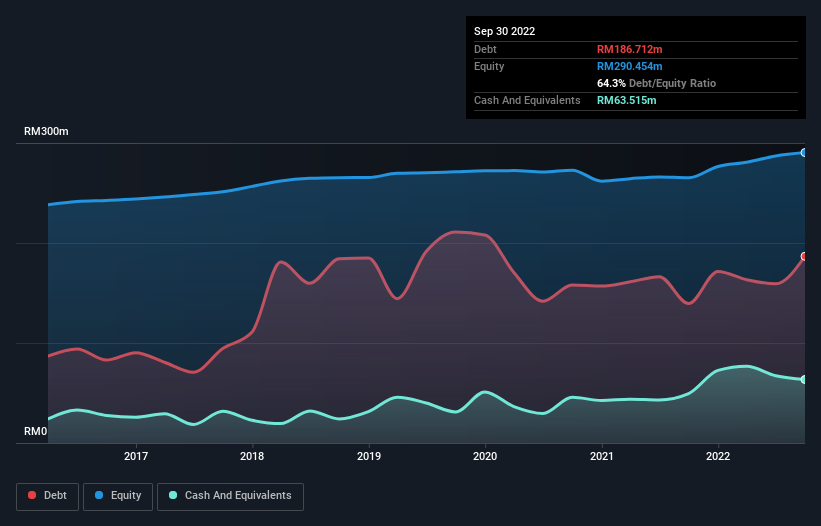- Malaysia
- /
- Trade Distributors
- /
- KLSE:KPSCB
KPS Consortium Berhad (KLSE:KPSCB) Could Easily Take On More Debt
The external fund manager backed by Berkshire Hathaway's Charlie Munger, Li Lu, makes no bones about it when he says 'The biggest investment risk is not the volatility of prices, but whether you will suffer a permanent loss of capital.' It's only natural to consider a company's balance sheet when you examine how risky it is, since debt is often involved when a business collapses. Importantly, KPS Consortium Berhad (KLSE:KPSCB) does carry debt. But is this debt a concern to shareholders?
Why Does Debt Bring Risk?
Generally speaking, debt only becomes a real problem when a company can't easily pay it off, either by raising capital or with its own cash flow. If things get really bad, the lenders can take control of the business. However, a more usual (but still expensive) situation is where a company must dilute shareholders at a cheap share price simply to get debt under control. Of course, plenty of companies use debt to fund growth, without any negative consequences. When we examine debt levels, we first consider both cash and debt levels, together.
Check out our latest analysis for KPS Consortium Berhad
What Is KPS Consortium Berhad's Debt?
You can click the graphic below for the historical numbers, but it shows that as of September 2022 KPS Consortium Berhad had RM186.7m of debt, an increase on RM139.4m, over one year. On the flip side, it has RM63.5m in cash leading to net debt of about RM123.2m.

How Healthy Is KPS Consortium Berhad's Balance Sheet?
According to the last reported balance sheet, KPS Consortium Berhad had liabilities of RM259.6m due within 12 months, and liabilities of RM26.5m due beyond 12 months. On the other hand, it had cash of RM63.5m and RM233.1m worth of receivables due within a year. So it actually has RM10.6m more liquid assets than total liabilities.
This short term liquidity is a sign that KPS Consortium Berhad could probably pay off its debt with ease, as its balance sheet is far from stretched.
We measure a company's debt load relative to its earnings power by looking at its net debt divided by its earnings before interest, tax, depreciation, and amortization (EBITDA) and by calculating how easily its earnings before interest and tax (EBIT) cover its interest expense (interest cover). Thus we consider debt relative to earnings both with and without depreciation and amortization expenses.
KPS Consortium Berhad's debt is 3.7 times its EBITDA, and its EBIT cover its interest expense 6.5 times over. Taken together this implies that, while we wouldn't want to see debt levels rise, we think it can handle its current leverage. Notably, KPS Consortium Berhad's EBIT launched higher than Elon Musk, gaining a whopping 1,059% on last year. When analysing debt levels, the balance sheet is the obvious place to start. But you can't view debt in total isolation; since KPS Consortium Berhad will need earnings to service that debt. So when considering debt, it's definitely worth looking at the earnings trend. Click here for an interactive snapshot.
Finally, while the tax-man may adore accounting profits, lenders only accept cold hard cash. So it's worth checking how much of that EBIT is backed by free cash flow. Happily for any shareholders, KPS Consortium Berhad actually produced more free cash flow than EBIT over the last three years. There's nothing better than incoming cash when it comes to staying in your lenders' good graces.
Our View
Happily, KPS Consortium Berhad's impressive conversion of EBIT to free cash flow implies it has the upper hand on its debt. But, on a more sombre note, we are a little concerned by its net debt to EBITDA. Overall, we don't think KPS Consortium Berhad is taking any bad risks, as its debt load seems modest. So we're not worried about the use of a little leverage on the balance sheet. The balance sheet is clearly the area to focus on when you are analysing debt. However, not all investment risk resides within the balance sheet - far from it. Be aware that KPS Consortium Berhad is showing 4 warning signs in our investment analysis , and 3 of those are significant...
At the end of the day, it's often better to focus on companies that are free from net debt. You can access our special list of such companies (all with a track record of profit growth). It's free.
Valuation is complex, but we're here to simplify it.
Discover if KPS Consortium Berhad might be undervalued or overvalued with our detailed analysis, featuring fair value estimates, potential risks, dividends, insider trades, and its financial condition.
Access Free AnalysisHave feedback on this article? Concerned about the content? Get in touch with us directly. Alternatively, email editorial-team (at) simplywallst.com.
This article by Simply Wall St is general in nature. We provide commentary based on historical data and analyst forecasts only using an unbiased methodology and our articles are not intended to be financial advice. It does not constitute a recommendation to buy or sell any stock, and does not take account of your objectives, or your financial situation. We aim to bring you long-term focused analysis driven by fundamental data. Note that our analysis may not factor in the latest price-sensitive company announcements or qualitative material. Simply Wall St has no position in any stocks mentioned.
About KLSE:KPSCB
KPS Consortium Berhad
An investment holding company, engages in the distribution and retail of wooden doors, plywood, and related building materials in Malaysia.
Excellent balance sheet and good value.
Market Insights
Community Narratives





